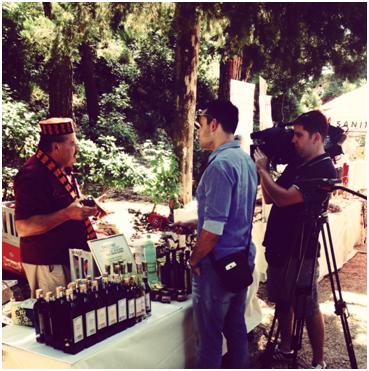Linking past and present in the Balkans: promotion of traditional products with modern tools

The Terra Madre Balkans network, with its more than 1500 members, kicked off its third meeting with an opening ceremony held on 19 June at the University of Dubrovnik in Croatia. The event was organized with the support of Slow Food and attended by over 200 delegates from 11 countries in Southeast Europe – Albania, Bosnia and Herzegovina, Bulgaria, Croatia, Greece, Kosovo, Montenegro, the Former Yugoslav Republic of Macedonia, Romania, Serbia and Turkey. Slow Food President Carlo Petrini participated in the event, which also received support from the President of the Republic of Croatia, Ivo Josipović. The Food and Agriculture Organization of the United Nations (FAO) under its collaboration with the European Bank for Reconstruction and Development (EBRD) organized a side-event “Traditional Products and Geographical Indications” sharing with the audience its long-term expertise on Geographical Indications (GIs) and improving linkages between agribusinesses and farmers.
Terra Madre Balkans unites food communities from Balkan countries, which value distinctive food traditions and share similar socio-economic conditions, aiming to promote better EU integration by strengthening the voice of civil society. Pascal Bernardoni, Director at REDD and FAO project partner in the field of agro-food supply chains and quality sign development, emphasized that “for the Balkans, EU integration means an increase in competition and, to face such competition, the countries must raise the quality of their products and find ways to differentiate them on both domestic and export markets”.
The FAO and EBRD have jointly supported quality linked to geographical origin over the past ten years, in the Caucasus and the Balkans. Projects in Georgia and Macedonia reinforced the protection and promotion of wine GIs and a recent project in Croatia helped groups of producers to successfully register two GIs, for the Neretva mandarin and the Baranjski kulen, paving the way for other groups of producers to market their products more actively. The Director of the Cooperative and member of the Kulen of Baranja Association, Anđelko Balaban, highlighted how the use of GIs has contributed to a greater visibility of the product. “The project allowed us to build a network of allies, such as retailers or certifying companies, that we can use to further develop our markets."
The involvement of producers and governments in each of these projects has contributed towards raising awareness on the potential benefits of origin-based labels, such as higher value-added to agricultural products, superior quality and increased competitiveness in national and export markets. Joško Babić, producer of Neretva mandarins and speaker at the Terra Madre Balkans workshop, explained the challenges faced by producers of mandarins in the Neretva Valley: “after having been first cultivated in the 1950s, mandarins saw a period of production growth with the rise of large-scale production in the 1960s, but marketing the total production became more and more difficult. The GI initiative supported by FAO, EBRD and the Ministry of Agriculture will help consumers in competitive markets like the EU recognize our mandarins as a different product, with its specific taste and origin.”
Currently, a FAO-EBRD project financed by Luxembourg supports the development of GIs and quality recognition for selected products in Serbia’s horticultural sector – sour cherries from Merosina, a raspberry product from Arilje, and wild berries from Kopaonik. While the Serbian horticultural sector has an annual total production estimated at 1.7 million tons of fruits and 1.8 million tons of vegetables, the primary production of fruit is characterized by small scale farms, generally old and low yielding cultivars, and limited marketing. The development of origin-based labels offers a way to achieve greater differentiation of Serbia’s fresh and processed fruit products.
The project will strengthen interactions between local agro-industrial companies, farmers and government authorities in Serbia, with particular attention on the inclusion of smallholders, in order to promote the development of sustainable GIs. This project has many synergies with a project funded by the State Secretariat for Economic Affairs of Switzerland (SECO). In the spirit of collaboration, the EBRD, FAO and SECO jointly funded the delegation of Serbian producers to Terra Madre.
The region offers numerous opportunities for which the Serbian and Croatian GI experience could prove valuable in improving the efficiency and inclusiveness of agrifood systems, especially given Slow Food’s support to projects that aim to sustain small-scale artisan productions facing extinction – the Tcherni Vit green cheese, wild fig slatko, and ljubitovica sarac garlic to name a few examples – map local traditional products, and promote short food supply chains.
More information regarding the 2014 Terra Madre event and related FAO-EBRD collaboration can be found here:
http://www.terramadre.info/en/terra-madre-balkans-2014-event-program/
